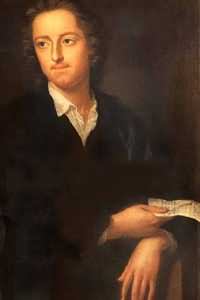16 February: Boreham on Thomas Gray

A Deathless Song
The most remarkable thing about Thomas Gray, the author of the immortal "Elegy," whose birthday this is, is his severe detachment from the age in which he lived. Like Lincoln, he belongs to the ages. His lot was cast in a martial era. The whole world was at war. Yet who, reading either the biography or the poems of Gray, would suspect that he lived through the most stirring, the most critical, and the most romantic days of English history?
Men do not always accept the citizenship of the age in which they happen to be born. Some march in advance of their time; some lag sadly behind it; whilst others, like Thomas Gray, stand estranged from it by a peculiar incompatibility of temperament. Like shipwrecked sailors cast upon some inhospitable shore, they gaze about them with looks of curiosity and astonishment, but are conscious of no bonds of sympathy uniting them with the period that a strange freak of fortune has chosen for their habitation.
It is because Thomas Gray, born and buried in the 18th century, did not, strictly speaking, belong to it, that each subsequent generation has adopted him as its own.
Blazing The Trail Of The Romantic Age
Sharing with William Collins the distinction of pioneering the era of romanticism in English literature, Gray began by presenting the world with some almost faultless odes. If he had contented himself with this achievement, his work would have stood as a model of all that such compositions should be and the average man would willingly have let it go at that. Happily, however, Gray followed his odes with his "Elegy" and the "Elegy" represents the romanticism of the odes set to a music that could be appreciated in clubs and taverns and chimney-corners. Matthew Arnold and others have eulogised the Greek quality in the structure of Gray's lyrical work; but, for all that, the students of the Pindaric Odes are today few and far between. Yet who, on the other hand, would care to confess his inability to recall some, at least, of the haunting phrases of the "Elegy"?
The curfew tolls the knells of parting day,
The lowing herd winds slowly o'er
the lea;
The ploughman homeward plods his weary way
And leaves the world
to darkness and to me.
The lilt is in perfect harmony with its setting, and there is a landscape in every line. The common people of England—city toilers and agricultural labourers—felt, as they read or heard it, that something had come into poetry that they had never noticed before. There was no single line in the "Elegy" that could not be understood and enjoyed by chimney sweeps, plough boys, and servant girls.
Of the man himself we know very little. There must have been something singularly lovable about him. On the tomb of William Robinson at Monk's Horton, it is inscribed, as the good man's proudest boast, that "he was especially intimate with the poet Gray"; at Richmond, the memorial tablet erected to the memory of Norman Nicholls claims that "he was the friend of the illustrious Gray"; whilst the attachment subsisting between Gray and Richard West is one of the choicest classics preserved in the beautiful records of noble friendships. Those who knew him well have assured us that he was a delightful companion, a staunch comrade, and an excellent fellow.
The pity is that we are compelled to take their word for it. Not one of them thought it worth his while to give us a biography of the man in the pages of which his attractions were defined and his charms perpetuated. To the world at large he has always appeared taciturn, silent, and reserved. "He lived," as Sir Edmund Goss avers, "in an involuntary isolation, a pathetic type of the solitude of the soul." And, living there, he must, so far as posterity is concerned, for ever remain there.
Simplicity That Secures A Universal Response
Turning from the man to his works, Gray must always be regarded as a poet whose reputation rests upon a single poem, and upon a poem that cost him much less effort than many of his more pretentious ventures. Dr. Compton Rickett defines romanticism as reality transfigured by new powers of vision and feeling.
That being so, Gray was a romanticist without knowing it. Commonplace life and everyday emotion were floodlit by the grace and sweetness of his minstrelsy; and, as a consequence, he became, although he never suspected it, the pioneer of a new and better age.
Although blind to its historic importance, Gray did recognise that in the "Elegy," he had struck a new note. "It is a thing with an end to it; a merit that most of my writings have lacked," he wrote to his old schoolfellow, Horace Walpole, in sending him the newly finished manuscript. Being published, it awoke a furore of applause. It ran through four editions in two months—a phenomenal record for those days. Since then it has become the most popular poem in the English language and has been translated into every tongue.
Professor Robinson has told us how, on the night of September 12, 1759, he was a recruit in General Wolfe's army and happened to be in the general's boat as the troops approached Quebec. "It was a fine, quiet night; and, as we pulled along with muffled oars, the general recited to one of his officers the greater part of Gray's "Elegy," adding, as he concluded: "I would prefer being the author of that poem to the glory, of beating the French tomorrow!"
The incident, which has inseparably intertwined itself with the lustre that enshrines the poet's name, is the reflection of a sentiment that has, at some time or other, found a place in all our hearts. It is the sentiment that has made both the poem and the poet immortals.
F W Boreham


<< Home